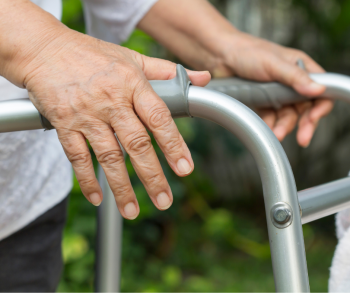Helping Seniors Overcome the Fear of Using Mobility Aids
January 22, 2025

Mobility aids such as walkers, canes, and wheelchairs are essential tools for increasing seniors' independence and safety. However, many seniors are hesitant to use these devices due to social stigmas, fear of dependence, or difficulty with change. Overcoming these issues can provide seniors with a better quality of life, and both loved ones and elder care play an important role in achieving this goal.
Understanding The Fear
The first step toward helping seniors is understanding the fear. For family members, this might be more difficult, especially if fear is something that’s not typical for their loved one. Elder care, however, is specially trained to handle such issues and can offer suggestions and a greater understanding to family members that allows them to better support seniors—starting with where fear and unwillingness to use mobility aids might come from, including the following:
- Stigma of Aging: Many seniors see mobility aids as a sign of weakness, which can be discouraging and frustrating.
- Fear of Dependence: Many seniors believe that using a mobility aid decreases their independence.
- Lack of Familiarity: Seniors may be unsure how to use the devices appropriately, causing concern about falling or being judged.
- Aesthetic Concerns: Some seniors may feel self-conscious about their appearance when using mobility aids.
Addressing these issues requires sensitivity, education, and gradual exposure to the advantages of these devices, which elder care and family members can offer by working together.
Strategies to Help Seniors Accept Mobility Aids
Some of the ways that elder care and family members can encourage seniors to accept mobility aids include the following:
- Normalize Their Use: Emphasize that mobility aids are common items that people of all ages use to improve their mobility. Showing examples and having an open conversation may help decrease the stigma and provide seniors with better understanding.
- Focus on Independence: It is essential to reframe mobility aids as instruments that support independence rather than restrict it. Demonstrating how these devices allow seniors to participate in activities they enjoy with more confidence and safety is key to loved ones trying them out for themselves.
- Provide Hands-On Training: If possible, family members or elder care can set up professional demonstrations and practice sessions to help seniors become familiar with using these aids.
- Tailor the Device to the Individual: It’s important to consult with healthcare specialists to ensure that the mobility device meets the senior's individual requirements and preferences. A properly adjusted device is not only safer, but also more pleasant and less threatening.
- Involve Peer Support: Encourage seniors to connect with peers who effectively use mobility aids. Hearing about happy experiences can boost morale and reduce feelings of loneliness.
How Elder Care Can Help
As mentioned, elder care is in a unique position to help with this issue, offering the guidance above, as well as education and counseling that includes not only the benefits of mobility aids but also addresses misconceptions. Additionally, elder care offers much-needed emotional support and day-to-day encouragement for seniors who are struggling.
With the correct support, seniors can overcome their fears surrounding mobility aids. Elder care plays an important role in steering this process by ensuring each senior's physical, emotional, and social requirements are met, as well as supporting family members along the way.
If you or your loved one is looking for Elder Care in Cupertino, CA, please call Familiar Surroundings Home Care.
Santa Clara County: (408) 979-9990
San Mateo County: (650) 353-9777
Santa Cruz County: (831) 480-3990


